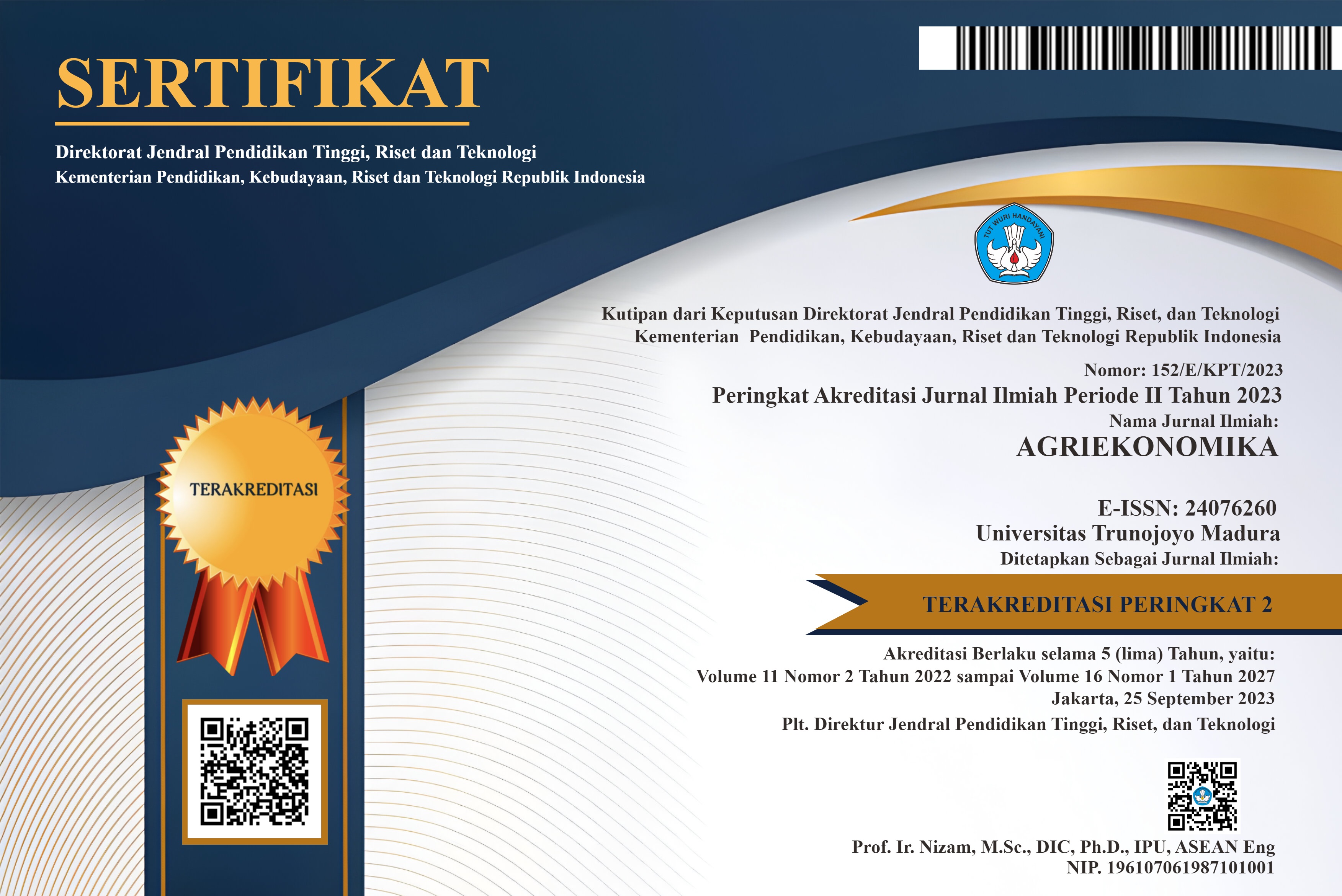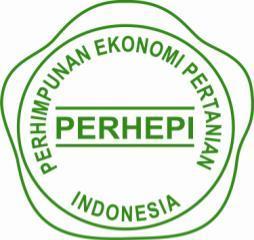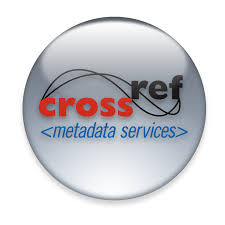Comparison Of Technology Usage On Rice Productivity In Banyuwangi
Abstract
Advances in Information and Communication Technology (ICT) present both opportunities and challenges in agriculture. This study examines how technology use affects rice production in Purwoharjo District, Banyumas Regency, Indonesia. The study looks at differences in farmer preferences related to village, gender, age, and education level. We used a descriptive quantitative approach, using primary data from interviews and questionnaires with 96 farmers out of 2,175 farmers. Stratified random sampling ensured demographic representation. The Likert scale and chi-square analysis determined statistical differences in technology use and its impact on productivity. The results showed that agricultural technology significantly increased rice productivity among male farmers, those aged 41–50 years and above 50 years, and those with primary and junior high school education. Internet use benefited male farmers, while social media had a positive impact on farmers aged over 50. Variations in technology adoption were observed across villages, particularly in Grajagan, Sumberasri, and Glagahagung. The study’s conclusions confirm that technology adoption plays a significant role in increasing rice productivity, particularly among certain demographic groups. However, disparities in access and utilisation highlight the need for targeted interventions to bridge the digital divide. Policymakers and stakeholders should focus on improving digital literacy, providing technological support, and ensuring infrastructure accessibility to maximise the benefits of ICT in agriculture. These findings support targeted policies to improve digital literacy and infrastructure, ensure equitable access to technology, and optimise productivity and economic conditions for farmers.
Keywords
Full Text:
PDFReferences
Adiarsi, G. R., Stellarosa, Y., & Silaban, M. W. (2015). Literasi Media Internet di Kalangan Mahasiswa. Humaniora, 6(4), 470. https://doi.org/10.21512/humaniora.v6i4.3376
Ahmad Nurhadi, Rob Sosiatri, M. M. S. (2022). Penggunaan Internet Terhadap Peningkatan Penjualan Dan Produktifitas Hasil Pertanian Padi Pada Desa Cihambulu, Subang, Jawa Barat. IDEA Abdimas Journal, 1(1), 24–28.
Ahyar, H., Maret, U. S., Andriani, H., Sukmana, D. J., Mada, U. G., Hardani, S.Pd., M. S., Nur Hikmatul Auliya, G. C. B., Helmina Andriani, M. S., Fardani, R. A., Ustiawaty, J., Utami, E. F., Sukmana, D. J., & Istiqomah, R. R. (2020). Buku Metode Penelitian Kualitatif & Kuantitatif (Issue March).
Alavi, M., Visentin, D. C., Thapa, D. K., Hunt, G. E., Watson, R., & Cleary, M. (2020). Journal of Advanced Nursing - 2020 - Alavi - Chi‐square for model fit in confirmatory factor analysis.pdf.
Aswin, A., & Mediyastuti Sofyan, M. (2022). Dinamika Pelaksanaan Electronic Governance Pemerintahan Daerah Di Indonesia. Kebijakan: Jurnal Ilmu Administrasi, 13(Vol. 13 No. 1). https://doi.org/10.23969/kebijakan.v13i1.5152
Badan Pusat Statistik Kabupaten Banyuwangi. (2022). Kecamatan Purwoharjo Dalam Angka 2022. https://www.ptonline.com/articles/how-to-get-better-mfi-results
Catur Yuantari, M., Kurniadi, A., & Ngatindriatun. (2016). Pemanfaatan Teknologi Informasi Untuk Meningkatkan Pemasaran Hasil Pertanian Di Desa Curut Kecamatan Penawangan Kabupaten Grobogan Jawa Tengah. Techno.COM, 15(1), 43–47.
Diartho, H. C. (2018). Penentuan Sektor Ekonomi Unggulan di Kabupaten Banyuwangi. Media Trend, 13(1), 146. https://doi.org/10.21107/mediatrend.v13i1.3631
Diartho, H. C. (2019). Environmental Tax as an Instrument to Restore Coastal Pollution in Banyuwangi Regency. August.https://doi.org/10.5923/j.economics.20170705.05
Herdinawati, L. U. (2017). Alasan Petani Muslim Menjual Hasil Panen Kepada Tengkulak di Desa. July 2014. https://doi.org/10.13140/RG.2.2.31089.07521
Janc, K., Czapiewski, K., & Wójcik, M. (2019). In the starting blocks for smart agriculture: The internet as a source of knowledge in transitional agriculture. NJAS - Wageningen Journal of Life Sciences, 90–91(September), 100309. https://doi.org/10.1016/j.njas.2019.100309
Komang, S., & Karyati, N. K. (2020). Adopsi Teknologi Informasi Komputer Dan Implikasinya Bagi Pertanian Di Bali. JURNAL MANAJEMEN AGRIBISNIS (Journal Of Agribusiness Management), 8(1), 61. https://doi.org/10.24843/jma.2020.v08.i01.p06
Makruf, E., Oktavia, Y., & Putra, W. E. (2011). Faktor-faktor yang mempengaruhi produksi padi sawah di kabupaten seluma. November.
Mesenbourg, T. L. (2018). Measuring the Digital Economy. Policy Papers, 18(016), 1. https://doi.org/10.5089/9781498307369.007
Musnaini, M., Junita, A., Wijoyo, H., & Indrawan, I. (2020). Digital business (Issue September).
Ren, W. (2021). Insights into Sustainable Development of China ’ s Marine Economy From the Perspective of Biased Technological Progress. 30(4), 3213–3220. https://doi.org/10.15244/pjoes/130899
Riniati, Putri, C., & Lutfhi, A. (2022). FOOD DEMAND SENSITIVITY DURING THE COVID-19. Journal Research of Social, Science, Economics, and Management, 01(8), 1026–1040.
Samsinar. (2018). pemanfaatan media sosial dalam organisasi - Penelusuran Google. 1–109.
Saputra, A. (2019). Survei Penggunaan Media Sosial Di Kalangan Mahasiswa Kota Padang Menggunakan Teori Uses and Gratifications. Baca: Jurnal Dokumentasi Dan Informasi, 40(2), 207. https://doi.org/10.14203/j.baca.v40i2.476
Sawitri, E., Astiti, M. S., & Fitriani, Y. (2019). Hambatan Dan Tantangan Pembelajaran Berbasis Teknologi Informasi Dan Komunikasi. Prosiding Seminar Nasional Pendidikan Program Pascasarjana Universitas PGRI Palembang, 202–213.
Sayuti, R. H., & Hidayati, S. A. (2020). Dampak Pandemi Covid-19 Terhadap Ekonomi Masyarakat di Nusa Tenggara Barat. RESIPROKAL: Jurnal Riset Sosiologi Progresif Aktual, 2(2), 133–150. https://doi.org/10.29303/resiprokal.v2i2.46
Sugiantara, I. G. N. M., & Utama, M. S. (2019). Pengaruh Tenaga Kerja, Teknologi Dan Pengalaman Bertani Terhadap Produktivitas Petani Dengan Pelatihan Sebagai Variabel Moderating. Buletin Studi Ekonomi, 1. https://doi.org/10.24843/bse.2019.v24.i01.p01
Sugiyono, A. (2014). Kemajuan Teknologi dan Pembangunan Ekonomi Dipresentasikan pada : Kuliah : Seminar Ekonomi Pembangunan Dosen : Dr . Budiono Sri Handoko , M . A . Disusun Oleh : Agus Sugiyono Program Pascasarjana : Magister Sains dan Doktor Program Studi Ilmu-Ilmu Ekonomi. May 2000. https://doi.org/10.13140/2.1.3017.4084
Wijanarko, & Sarwititi, S. (2016). Penggunaan ICT Dalam Penyadaran Kritis Gerakan Petani.
Xiu, J., Zhang, G. xing, & Hu, Y. (2019). Which kind of directed technical change does China’s economy have? From the perspective of energy-saving and low-carbon. Journal of Cleaner Production, 233, 160–168. https://doi.org/10.1016/j.jclepro.2019.05.296
DOI: https://doi.org/10.21107/agriekonomika.v12i2.18642
Refbacks
- There are currently no refbacks.







